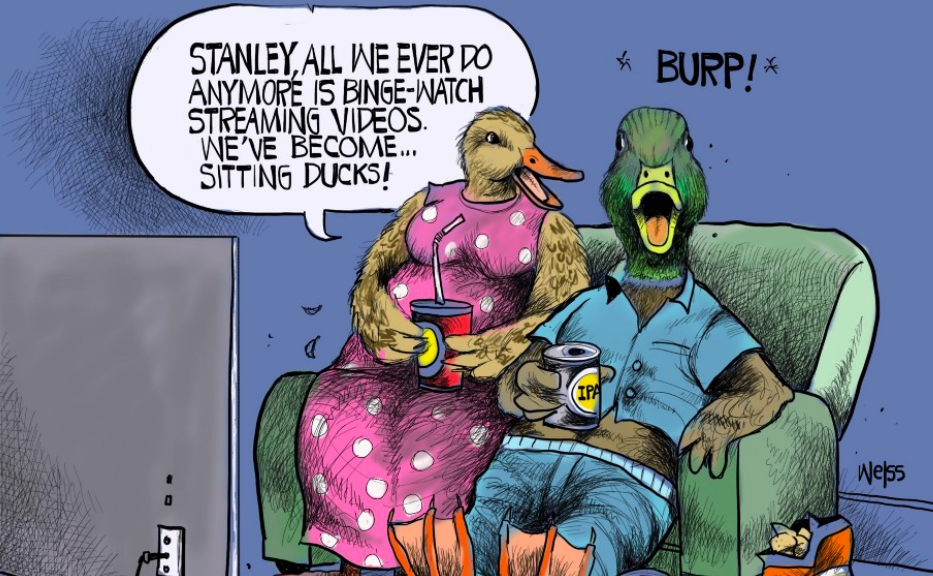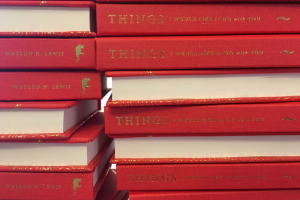Not to mention your health.
What do the New York City blackout of 1965, the Oklahoma City bombing of 1995, the terrorist attacks of September 11, 2001, and the tropical storms hitting Florida in 2004 all have in common? The press reported increased birth rates nine months after these events.
Anecdotal evidence and some studies suggest increased fertility rates result from catastrophic events. Other studies have not found a correlation.
Still, it stands to reason that if the power goes off, so do the televisions and internet access. That means the candles and flashlights come out, and suddenly people have little to do but interact with one another. And sometimes, that leads to intimacy.
Sorry Honey, I Have Netflix
There used to be a time for pauses in our days. Downtime and breaks, where we could talk to one another. Recharge, interact, laugh, catch up, and reconnect. Maybe even get intimate. But things have changed.
When we watched television in the past, there were commercials to endure. We used those interruptions to talk to one another. Also, a lot of favorite TV shows were done by 10 p.m. Many networks went off air by midnight, followed by the national anthem and then static.
Fast-forward to today. The internet is available 24-7. You can watch YouTube videos at 4 a.m. if you wish. There are so many digital distractions now, readily available on our devices, that we have begun to tune out and ignore our spouses, partners, and significant others.
There’s even a word for it: “Phubbing.” It means, “The practice of ignoring one’s companion or companions in order to pay attention to one’s phone or other mobile device.”
All of this digital distraction is taking a toll on our intimate lives. Perhaps the biggest culprit of all is streaming video.
People used to say, “Sorry honey, I have a headache.” Now it’s, “Sorry honey, I have Netflix.”
Honey, You Look Cute Tonight
A recent Wall Street Journal article examined whether streaming video is contributing to the nation’s declining fertility rate.
There are a lot of theories as to why the American fertility rate has hit an all-time low. Perhaps it’s an after effect of the recession. Some point to long-term birth control. Others blame Netflix.
A 2017 article in Archives of Sexual Behavior states that Americans are having less sex in part due to streaming video. The lead author of that study, Dr. Jean Twenge, contrasted the old days of TV commercials with today’s nonstop, streaming services. As she notes in the Wall Street Journal article:
“Now, if you’re watching something streaming, the next episode is immediately available, and there are no commercials where you could look over and say, ‘Honey, you look cute tonight.’”
The article profiles a 36-year-old woman who says there’s always a new episode of “Schitt’s Creek” to watch, adding: “We get so comfortable with blankets, and you got a glass of wine going, and one of us usually ends up falling asleep.”
The Wall Street Journal did a survey in March and found the following: “One in four people said they turned down intimacy in favor of binge-watching.”
The problem is actually bigger than just streaming videos. Social media and internet distractions seem to dominate nearly every free moment of our lives.
Architecting the Menu
Tristan Harris is an expert on how technology hijacks our psychological vulnerabilities. The Atlantic called Tristan Harris the “closest thing Silicon Valley has to a conscience.”
According to his website, Tristan Harris “spent three years as a Google Design Ethicist developing a framework for how technology should ‘ethically’ steer thoughts and actions for billions of people from screens.”
Harris wrote an essay about how technology hijacks our minds through tricks like limited choices. Harris wrote:
“Western Culture is built around ideals of individual choice and freedom. Millions of us fiercely defend our right to make ‘free’ choices, while we ignore how we’re manipulated upstream by limited menus we didn’t choose.”
Harris notes that this is what magicians do, adding:
“They give people the illusion of free choice while architecting the menu so that they win, no matter what you choose.”
We don’t stop to ask what’s not on the menu or question the options. Nor do we consider the goals and objectives of the provider, such as YouTube and Netflix (both of which want us to use their services as much as possible).
Perhaps the most important question to ask is, “Is this menu empowering for my original need, or are the choices actually a distraction?”
We get so comfortable with Netflix and our devices that they become the default menu. We fail to look beyond them and explore our original need, which might be to reconnect with our significant other.
Why not look beyond the digital menus? How about going out to a music show, or a new coffee shop?
Picking a day of the week for date night is one way to revive your love life. Agree to ditch the digital distractions and go out. Tell each other stories. Look into one another’s eyes. Order new and interesting foods. Talk and laugh and rediscover the power of real life over digital life.
Sitting Ducks
The Journal of the American Medical Association recently reported that Americans are sitting more than ever. The study found that average sitting hours a day increased from 7.0 to 8.2 among adolescents and from 5.5 to 6.4 among adults.
Sedentary behavior increases our risks for diabetes, heart disease, and some cancers. In many ways, our increased addiction to streaming videos and digital devices has made us sitting ducks for increased health problems.
Take a close look at your own digital and television habits. Are they contributing to your health and intimate life, or detracting? The reality is that many of us sit for hours at work. Then we come home and sit for hours watching programs or playing on our devices. Neither is likely to improve our health or love lives.
Consider Tristan Harris’s observations about the limited (by design) digital menus we keep ordering from. Ever notice how when your YouTube video ends, another starts to play immediately afterward? That’s because YouTube doesn’t want you to leave.
My advice is, set aside time for date nights. Look for new and interesting “real life” experiences to balance out your screen time. Get off your fanny and take the dog for a long walk. Play frisbee with your kid. Take your honey out for a hike in nature.
Walk away from the binge-watching and glowing screens more often, and expand your menu of choices to include analog delights and real-life adventures.
You might just lose a few pounds and reignite those relationship flames.
~







Read 17 comments and reply